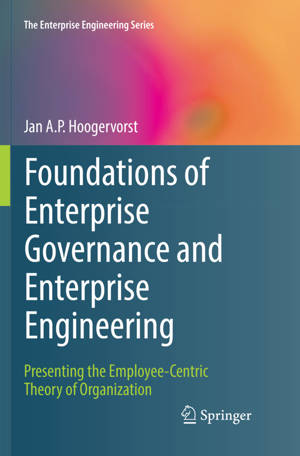
- Retrait gratuit dans votre magasin Club
- 7.000.000 titres dans notre catalogue
- Payer en toute sécurité
- Toujours un magasin près de chez vous
- Retrait gratuit dans votre magasin Club
- 7.000.0000 titres dans notre catalogue
- Payer en toute sécurité
- Toujours un magasin près de chez vous
Foundations of Enterprise Governance and Enterprise Engineering
Presenting the Employee-Centric Theory of Organization
Jan A P Hoogervorst
84,45 €
+ 168 points
Format
Description
This book outlines the important foundational insights for enterprise governance and enterprise engineering, which are obviously provided by the social and organization sciences, but also by other sciences such as philosophy and information technology. It presents an employee-centric theory of organization in order to secure enterprise performance and also to comply with moral considerations about society and human individuals. This is necessary as prescriptions based on 'best practices' or the 'best managed companies' are often merely anecdotal, faddish, or controversial, and based on unsubstantiated pseudo-theories.
The book consists of four main chapters, the first of which summarizes the importance of foundational insights for enterprises and explains the mutual relationships between the basic elements of enterprise governance and enterprise engineering. Next, chapter 2 explains the necessary philosophical foundations concerning knowledge, truth, language, and human existence. Subsequently, chapter 3 describes the ontological foundation and the nature of society and enterprises, as understanding their characteristics is a prerequisite for understanding and designing enterprises. Finally, chapter 4 approaches ideological foundations as beliefs and convictions, as they create specific requirements for the design of enterprises. In this way, the book covers all the cornerstones of the employee-centric theory of organization, drawing on foundational insights.
The book is mainly intended for students specializing in areas such as business administration, management and organization science, governance, and enterprise and information systems design. However, professionals working in these areas will also benefit from the book, as it allows them to gain a deeper understanding of the theoretical foundations of their work and will thus help them to avoid strategic failures due to a lack of coherence and consistency between the various parts of their organization.
The book consists of four main chapters, the first of which summarizes the importance of foundational insights for enterprises and explains the mutual relationships between the basic elements of enterprise governance and enterprise engineering. Next, chapter 2 explains the necessary philosophical foundations concerning knowledge, truth, language, and human existence. Subsequently, chapter 3 describes the ontological foundation and the nature of society and enterprises, as understanding their characteristics is a prerequisite for understanding and designing enterprises. Finally, chapter 4 approaches ideological foundations as beliefs and convictions, as they create specific requirements for the design of enterprises. In this way, the book covers all the cornerstones of the employee-centric theory of organization, drawing on foundational insights.
The book is mainly intended for students specializing in areas such as business administration, management and organization science, governance, and enterprise and information systems design. However, professionals working in these areas will also benefit from the book, as it allows them to gain a deeper understanding of the theoretical foundations of their work and will thus help them to avoid strategic failures due to a lack of coherence and consistency between the various parts of their organization.
Spécifications
Parties prenantes
- Auteur(s) :
- Editeur:
Contenu
- Nombre de pages :
- 574
- Langue:
- Anglais
- Collection :
Caractéristiques
- EAN:
- 9783030101572
- Date de parution :
- 09-12-18
- Format:
- Livre broché
- Format numérique:
- Trade paperback (VS)
- Dimensions :
- 155 mm x 235 mm
- Poids :
- 901 g

Les avis
Nous publions uniquement les avis qui respectent les conditions requises. Consultez nos conditions pour les avis.






